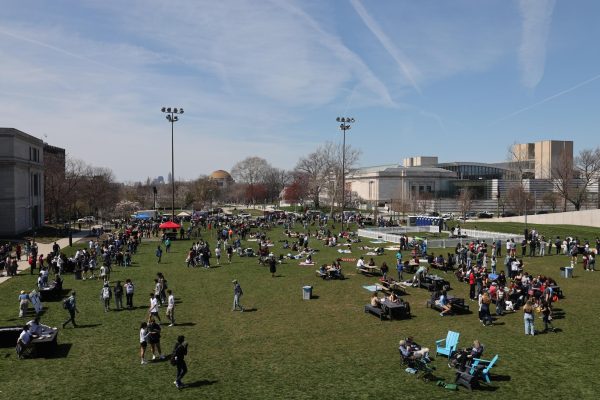Salm: Stress relief is imperative in an increasingly competitive society
Challenges encountered in life are frequently met with the body’s natural fight-or-flight response to unfamiliar or troublesome circumstances—stress. For a few decades, scientists have associated unhealthy amounts of stress with cognitive repercussions and physical dangers, such as cardiovascular diseases, high blood pressure and diabetes.
As these decades have passed, society has become increasingly more competitive with regards to economic markets, education requirements and occupational opportunities. The job market has transformed to incorporate more skill-based careers, so occupations are generally less labor-intensive and require greater mental strength and endurance. As a result, to make it in this world, individuals must possess greater academic attributes and sharper fluid intelligence than ever before.
This trend of increasing competitiveness can be seen with greater clarity when undergraduate applications of the current parent generation are compared to the filial generation. For example, someone from our parents’ generation could hypothetically earn an ACT score of 28, be involved in possibly one or two extracurriculars and obtain a GPA of 3.6. This individual could easily be accepted into a private university of admirable reputation with a scholarship covering all tuition expenses.
In contrast, an individual from our generation hypothetically needs to earn an ACT score of 32, be involved in a multitude of extracurriculars, serving as an executive officer of one or two of those extracurricular groups and obtain a GPA of no less than 3.9. In addition, ambitious students are encouraged to challenge themselves academically so they enroll in anywhere between five and 11 AP courses throughout their high school career. With these statistics and recommendations, there is a slight potential for the student to be admitted into a private university with about a third of tuition covered by scholarships and the other third covered by federal loans.
Compared to collegiate academics and involvement, high school commitments are relatively insignificant. But that’s the issue. If students are beginning college with a timeline already riddled with prolonged stress, mental instability poses a greater threat and burnout can become more frequent.
According to the National Center for Biotechnology Information, individuals who experience burnout and high levels of stress have the “lowest self-esteem and the highest external locus of control [of the two experimental groups].” This experimental conclusion emphasizes the negative influence of stress upon mental health since it portrays how stress can impact self-image and outlook on personal productivity.
Similarly, prolonged stress can lead to diabetes. According to QIAGEN, a biomolecular statistics analyzer, there is a correlation between individuals with type 2 diabetes and Alzheimer’s disease. Reiterated, prolonged stress can induce type 2 diabetes which correlates with the onset of Alzheimer’s. With this in mind, individuals and communities must devise better mechanisms for stress relief.
Since current research (performed with individuals from our grandparents’ generation) reflects the correlation between stress and dementia, stress relief is ever more imperative for current college students. Current undergraduates live in a more competitive and therefore more stressful environment than that of their parents and grandparents, so there is a potentially greater opportunity for a larger population to experience dementia in old age.
As a result, students should design effective methods for stress relief. For many individuals, stress relief comes in the form of methodical exercise, yoga, meditation, leisurely reading, hiking, biking, sun-bathing, socializing, jamming to music or any other activity that puts a smile on their face and makes them feel more grounded. Eradicating stress is truly unique for every person.
Regardless of the intensity of the stress-relieving mechanism, students should carry out rejuvenating acts on a frequent schedule as their minds, body and memory depend upon the effective elimination of unproductive stress.

















